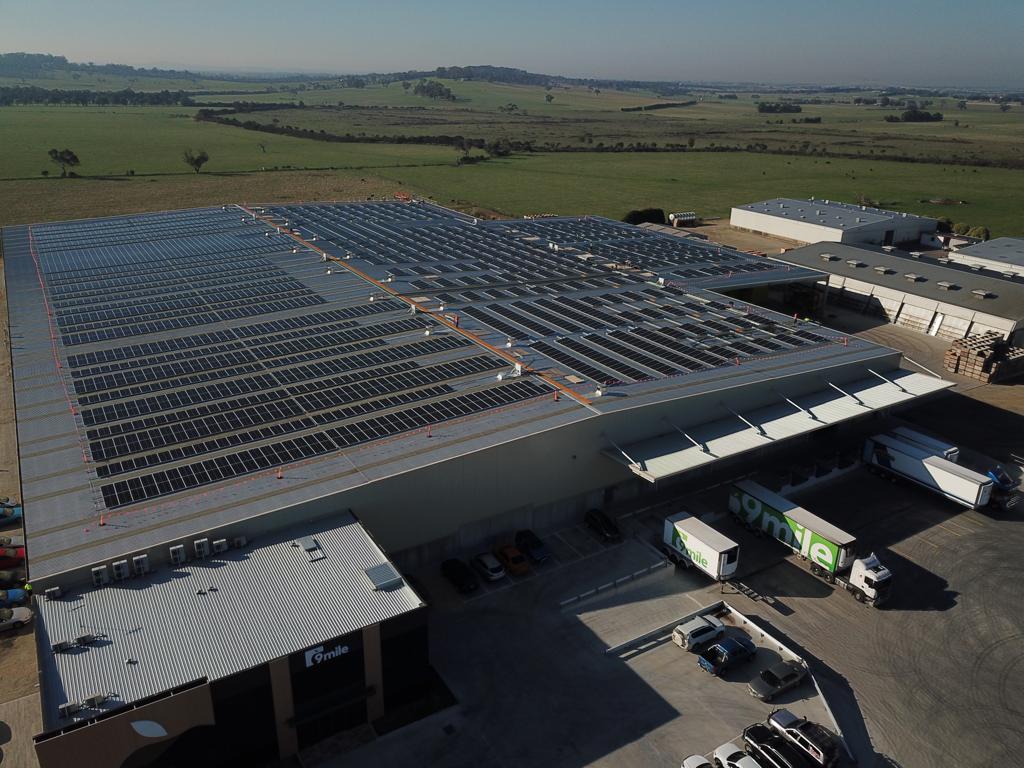A large industrial agriculture facility in Victoria that processes and packs apples has recently installed a 1.4 MW solar PV system consisting of 2,850 solar panels spread across 17,600 square metres of industrial roof space in Tynong, about 60 kilometres south east of Melbourne in South-East Gippsland.
Over the past seven months a series of large megawatt-sized solar generators have been installed at large commercial and industrial businesses surrounding Melbourne. This particularly project was financed by the Bank of Melbourne’s energy efficiency program and the Clean Energy Finance Corporation (CEFC).
Nine Mile Fresh is one of the most advanced apple sorting facilities in the world, dealing with supply from 50 apple farms across Victoria and Tasmania. An operation of this size requires a sophisticated high-tech system, featuring channels of water to ensure the produce is not bruised, as well as a grading and sorting system. Of course, such high-tech equipment requires a great deal of power – 5,700 MWh each year, the equivalent of 1000 Victorian households struggling with Netflix addiction.
The 1.4 MW system should cut at least a third off the facility’s energy bill, which is nothing to laugh with annual energy bills exceeding $1 million.
The installation was managed by Australian energy services business Verdia, CEO Paul Peters said the solar installation would “pay for itself in just under six years and then provide a third of the on-site electricity for free.”
“Energy from the sun is helping to grow the apples and its now being harvested to sort and pack them off to the supermarket shelves throughout the east coast,” said Peters, upon whom the poetics was not lost.
Nine Mile Fresh chose to outsource management of the installation for a range of reasons, but ultimately, said Nine Mile Fresh Director James Ryan, by outsourcing the financial and technical management, the business could remove much of the risk from delivering the program in house. “…it meant we could see the financial benefits sooner and hedge against future price shocks for a large portion of our electricity use,” said Ryan.
The Nine Mile Fresh project is just one of an approximated 68 MW of behind-the-metre solar PV systems being developed by Verida across Australia. According to the Clean Energy Council’s (CEC) 2019 Report there was an 80% growth in medium scale solar PV installations (100 kW – 5 MW) in 2018, and in 2019 the growth continues.
This content is protected by copyright and may not be reused. If you want to cooperate with us and would like to reuse some of our content, please contact: editors@pv-magazine.com.









By submitting this form you agree to pv magazine using your data for the purposes of publishing your comment.
Your personal data will only be disclosed or otherwise transmitted to third parties for the purposes of spam filtering or if this is necessary for technical maintenance of the website. Any other transfer to third parties will not take place unless this is justified on the basis of applicable data protection regulations or if pv magazine is legally obliged to do so.
You may revoke this consent at any time with effect for the future, in which case your personal data will be deleted immediately. Otherwise, your data will be deleted if pv magazine has processed your request or the purpose of data storage is fulfilled.
Further information on data privacy can be found in our Data Protection Policy.